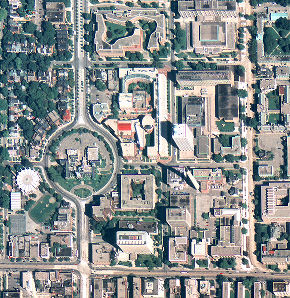|
The Present St. George Campus |
|
|
The incremental evolution of the campus grounds and facilities and a lack of comprehensive campus planning has left the city and the University with a district that does not live up to its full potential as a high-quality, inspiring and unique urban place in which to live and learn. Currently, as seen from the air, parts of the campus are relatively denuded of vegetation as contrasted with the rest of the city. The Taddle Creek ravine has been filled and the watercourse has disappeared. The proliferation of surface parking and garbage dumpsters in open spaces presents a negative image and makes pedestrian movement difficult. Widened streets, narrow sidewalks, fast-moving traffic and grade separations create challenges for students walking or biking to classes, particularly on Queen's Park Crescent. The changes to the campus landscape over the past 150 years have created a district with limited pedestrian amenity, disjointed open spaces, and little coherence in its landscape image. At the same time, many of the elements of the original campus landscape are still in evidence today: interlocking courtyards, patterns of movement and use, landmarks, and topography. These offer enormous potential for the reconnection and revitalization of the campus open spaces. |
|



